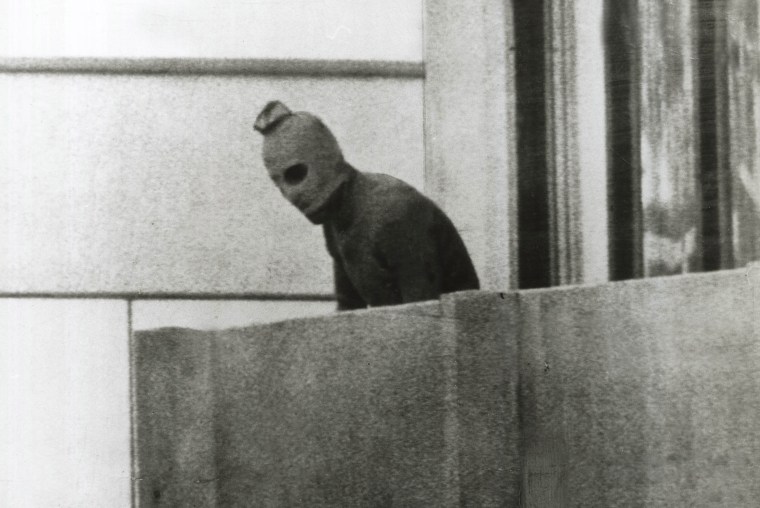Israel has a long-standing history of pursuing and assassinating its enemies. The recent conflict between Israel and Hamas has once again brought Israel’s determination to the forefront. This time, however, Israel faces a more complex challenge as it targets a larger, better-organized, and heavily armed organization. The stakes are high, not just for Israel but for the rest of the world.
Operation Wrath of God: A Symbol of Israel’s Resolve
Israel’s relentless pursuit of its adversaries can be traced back to the infamous Operation Wrath of God. This operation followed the 1972 Munich Olympics massacre, where Palestinian terrorists killed 11 Israeli athletes. The late spy chief Zvi Zamir led the manhunt for those responsible. The campaign became a symbol of Israel’s unwavering commitment to tracking down its enemies, no matter where they may hide.

Image: A member of the Black September commando group appears on the balcony where several members of the Israeli Olympic team were being held hostage in Munich on Sept. 5, 1972. (Russel McPhedran / Fairfax Media via Getty Images file)
Israel’s Targeted Approach
Israel’s recent targeted killing of Hamas senior leader Saleh al-Arouri in Beirut demonstrates its willingness to go after its adversaries beyond the confines of the Gaza battlefield. By carrying out such operations, Israel aims to send a strong message to Hamas, even at the risk of provoking a confrontation with Hezbollah.
Israeli intelligence services displayed an impressive level of accuracy and precision in this operation. They not only had reliable intelligence on the target but also had dynamic collection capabilities to track Arouri’s movements in Beirut. However, the task of targeting Hamas operatives outside of Lebanon poses greater challenges due to technical and political complexities.
Israel’s approach to targeted killings has faced criticism from human rights groups and foreign governments. Nevertheless, the Israeli government considers it a necessary measure in self-defense against terrorist groups. Israel’s Supreme Court has ruled that killing Hamas operatives is permissible on a case-by-case basis, as long as the risk to innocent bystanders is minimized.
The Complicated Path to Hamas’ Leadership
Tracking down Hamas operatives in the Middle East poses considerable challenges for Israel. Unlike the 1970s, when Mossad could operate relatively undetected in Europe, Hamas does not have a significant presence there. Hamas’ political headquarters are based in Qatar, and the group has operatives scattered across the Middle East, including in Turkey.

Image: Lebanese civil defense members spray water on the street on Jan. 3, 2024, at the building that was hit the day before by a strike that killed Hamas deputy leader Saleh al-Arouri in Beirut. (Anwar Amro / AFP – Getty Images)
Digital technology has made it more challenging to carry out covert operations using forged passports and aliases. Countries like Qatar and the United Arab Emirates have advanced electronic surveillance systems that make clandestine operations difficult. Surveillance in these countries is pervasive, limiting Israel’s ability to go after Hamas leadership there.
In recent negotiations between Israel and Hamas, Qatar has played a crucial role as an intermediary. Israel would be reluctant to jeopardize this communication channel and any potential future hostage releases. Similarly, Turkey, another possible diplomatic channel, might be off-limits for targeted killings.
The Uncertain Impact on Hamas
Even if Israel manages to eliminate Hamas’ leadership, the effect on the organization as a whole remains uncertain. Hamas has deep roots in Gaza, an extensive arsenal of weapons, and a global network of political and financial support. Past assassinations of Hamas leaders have failed to inflict lasting damage on the group and, in some cases, have had unintended consequences.
Israel’s reputation for efficiency and stealth in eliminating its enemies has not been without its share of mishaps and failures. Devastating mistakes and embarrassing exposures have occurred in the past, jeopardizing Israel’s intelligence network and reputation. Assassinations alone are not seen as a solution to the Middle East conflict.
A Message of Resolve
Despite the challenges and uncertainties, Israel sees the need to send a message to Hamas and its adversaries. The recent attack on October 7th has only strengthened Israel’s resolve to pursue those responsible. Mossad’s chief, David Barnea, has vowed to track down all involved, directly or indirectly, in the assault. While it may take time, as it did after the Munich massacre, Israel is determined to bring them to justice.
Israel’s pursuit of Hamas is a historic battle that continues to unfold. The outcome remains uncertain, but Israel’s determination to protect its citizens and send a message of strength is unwavering.
This article was originally published on F5 Magazine.

Definitely believe that which you stated. Your favorite reason appeared to be on the web the easiest thing to be aware of. I say to you, I definitely get irked while people think about worries that they just don’t know about. You managed to hit the nail upon the top and also defined out the whole thing without having side-effects , people can take a signal. Will probably be back to get more. Thanks
It’s actually a nice and helpful piece of info. I’m satisfied that you shared this helpful info with us. Please stay us informed like this. Thanks for sharing.